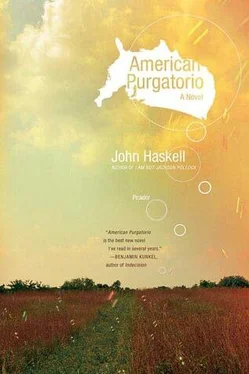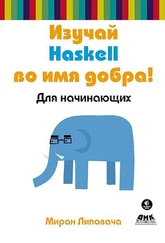John Haskell - American Purgatorio
Здесь есть возможность читать онлайн «John Haskell - American Purgatorio» весь текст электронной книги совершенно бесплатно (целиком полную версию без сокращений). В некоторых случаях можно слушать аудио, скачать через торрент в формате fb2 и присутствует краткое содержание. Год выпуска: 2006, Издательство: Picador, Жанр: Современная проза, на английском языке. Описание произведения, (предисловие) а так же отзывы посетителей доступны на портале библиотеки ЛибКат.
- Название:American Purgatorio
- Автор:
- Издательство:Picador
- Жанр:
- Год:2006
- ISBN:нет данных
- Рейтинг книги:3 / 5. Голосов: 1
-
Избранное:Добавить в избранное
- Отзывы:
-
Ваша оценка:
- 60
- 1
- 2
- 3
- 4
- 5
American Purgatorio: краткое содержание, описание и аннотация
Предлагаем к чтению аннотацию, описание, краткое содержание или предисловие (зависит от того, что написал сам автор книги «American Purgatorio»). Если вы не нашли необходимую информацию о книге — напишите в комментариях, мы постараемся отыскать её.
Los Angeles Times
American Purgatorio — читать онлайн бесплатно полную книгу (весь текст) целиком
Ниже представлен текст книги, разбитый по страницам. Система сохранения места последней прочитанной страницы, позволяет с удобством читать онлайн бесплатно книгу «American Purgatorio», без необходимости каждый раз заново искать на чём Вы остановились. Поставьте закладку, и сможете в любой момент перейти на страницу, на которой закончили чтение.
Интервал:
Закладка:
It’s not that I can’t go on, it’s just that I don’t feel like it.
And you might call this a low point, and I might have called it that, but in calling it that, I would have made it a thing with a name, and since I was a thing with a different name, I would have separated myself from the thing I was naming, in this case the quicksand of hopelessness. But I didn’t separate myself. Instead I went to the low point, and in a way embraced the low point, and fueled by the feeling I was having, the low point sank even lower.
3
Evening descended on the desert. After a while I found myself in the middle of darkness, literally. Looking up at the night sky beyond the overpass I could see the stars, which would have been considered beautiful, and the moon, having already set — that was also probably beautiful, but I was a thing apart from beauty or the recognition of beauty.
That was when the car pulled over onto the edge of the highway. It was an old brown Mercedes with two guys sitting in the front seat. The passenger window was rolled down and a stubble-faced man was telling me to hop in, hop in, so I did. It was a four-door and I got in the back and off we went.
The passenger was a big guy with stringy, dirty-blond hair. He swung his arm over the seat and said, “Where are you going?”
“Where are you going?” I asked him.
And he answered, “All the way, man, just like you.”
His name was Jimbo, and the driver, with dark hair, was Craig. They were both drinking from cans of beer, smoking cigarettes, and they seemed extremely friendly. They asked if I could contribute to the gas fund, and when I said I couldn’t, they didn’t seem to mind. Jimbo passed me a beer and it seemed as if we were all good buddies.
Since they didn’t have gas money either, what they would do is pull into gas stations, and Jimbo would go into the store, begin to seem to buy a few bits of food, and then, when Craig had filled the car with gas, Jimbo would run back to the car and they’d drive off without paying. “Living off the land,” Craig said. He took the role of the level-headed, intelligent one. Jimbo was wilder and prone to small but detectable fits of anger.
But they seemed to like me, and they convinced me, after a barrage of pointed questions, to tell the story of Anne, which I did, and when I did they told me not to worry. “We’ll catch her, man,” they said, as if they hadn’t heard that she was dead. Although we’d been driving fast enough before that, we drove even faster, as if we might possibly catch up with her.
And I didn’t mind.
At a certain point I offered to buy them some real food. I’ll pay with my credit card, I thought, and so we stopped at a roadside café near a place called Calexico, sat at a booth by the window, and had some eggs and coffee.
A rotund waitress set paper place mats in front of us, with drawings of desert flora and fauna. Craig and Jimbo ordered a lot of food and they advised me to do the same. “Might be your last supper, man,” Craig said.
I nodded without quite knowing why. The waitress wrote the orders on a pad. When Craig said to her, with a lewd smile, “I bet your eggs are the best in town,” she tried to smile back. The food came, we ate, I presented my credit card, and when the waitress returned she had bad news. The card wasn’t responding. I gave her another and then another and they all turned out to be invalid.
“You’re maxed out, man,” Craig told me, not upset about it. In fact he went ahead and ordered a pie, to go.
I said something about washing dishes to pay the bill, and Craig said, “Maybe we won’t have to.” His smile was full of yellow teeth.
“We have to do something,” I said. “Wash dishes or…”
“Like in a movie, right?” Jimbo said.
And when the pie arrived, all boxed up and tied, Craig announced that he was getting money from the car, and he got up and left. And when the waitress went into the back part of the café, Jimbo got up. I reminded him that we hadn’t paid the bill but he kept walking, past the cash register, out the glass door. First Craig, then Jimbo, and I was like a prisoner. I felt like one, and so I surrendered. I unbuckled my watch strap, left my watch on the table, and then I walked out to the car.
They wanted me to enter their world, to join their club, the club of not doing good, and for no reason other than the reason of least resistance I resigned myself to membership in that club, and to whatever and wherever that resignation led. They supplied food and drink and travel, and although I didn’t like the idea of stealing everything, I didn’t see any alternative except getting out of the car, and since I was in the car I didn’t want to get out. And they didn’t want me out. They wanted me to be one of them.
“You’re staying with us, man. The three amigos.”
The beer Jimbo drank was barely cool, the ice they’d once had in their Styrofoam bucket had long ago melted, but they wanted me to drink. It was implied in their encouragement. They were almost demanding that I keep drinking beer. When I asked them to stop at the next bathroom they insisted I pee out the window. I didn’t want to pee out the window but I was too tired or too weak, or more likely, I couldn’t see what difference it would make. So I knelt on the seat, leaned out as far as I could, and of course I peed all over myself. And the funny thing was, I didn’t seem to care. I sat back down in the leather seat and they told me I needed to rest. “You need your energy, man, if you want to find your girlfriend.”
“Wife,” I told them.
“Whatever,” Jimbo said, and he told me to stretch out and relax. And because I was exhausted, I put my head on my backpack. But Craig and Jimbo didn’t stop talking, and they didn’t stop trying to get me to drink. They seemed to have an endless supply of both words and lukewarm beer, and try as I might to keep up with their drinking, at a certain point I got full of beer, didn’t want any beer, and I told them, “I don’t want any more.”
It wasn’t just the beer. It was my unwillingness to listen to them, the sense of being polluted by their words and their attitudes. And at this point the mood might have turned sour except that we were coming down out of the hills, the last range of rocky hills before the coast. And by the time we entered the area of greater metropolitan San Diego the two of them were happy again. They started talking about Anne, as if she wasn’t dead, coming up with schemes to find her. “Put an ad in the paper,” they said, or “Put up flyers on telephone poles.” They knew San Diego like the backs of their dicks, they said, and they told me to relax, to do nothing, and let them take care of everything.
The brown land was frosted with springtime green, but mainly it was covered with houses. Millions of people lived in the subdivisions cut into the hillsides. We drove through a town called El Cajon, which means “the box,” and through La Mesa, which means “the table,” and I didn’t know where we were going, or where I was gong with them, until, following the freeway to the end, we arrived at the Pacific Ocean. Craig parked the car near a pier in a place called Pacific Beach. A lot of people in bathing suits were walking on the streets and it was warm, even before summer.
Craig and Jimbo told me to watch the car while they got out, walked across a nearby intersection, and returned with bags full of hamburgers and french fries. They divvied up the waxy paper bags and as we were about to eat Craig realized we didn’t have any ketchup. “Can’t eat without ketchup,” he said, and I was the one volunteered to go back to the fast-food restaurant and get some.
Which I did. It felt good to stretch my legs and see people again. No one looked up when I walked to the condiment counter and grabbed a large handful of ketchup packages. I took this booty back to the waiting car, but the car wasn’t waiting. I looked in various parking lots, and it wasn’t there. It wasn’t parked on the street, and it wasn’t circling the street, and although I waited for them, pacing back and forth, hoping they went to get some gas, I knew that now, here I was, with nothing. I threw the ketchup packages into a plastic trash container.
Читать дальшеИнтервал:
Закладка:
Похожие книги на «American Purgatorio»
Представляем Вашему вниманию похожие книги на «American Purgatorio» списком для выбора. Мы отобрали схожую по названию и смыслу литературу в надежде предоставить читателям больше вариантов отыскать новые, интересные, ещё непрочитанные произведения.
Обсуждение, отзывы о книге «American Purgatorio» и просто собственные мнения читателей. Оставьте ваши комментарии, напишите, что Вы думаете о произведении, его смысле или главных героях. Укажите что конкретно понравилось, а что нет, и почему Вы так считаете.











